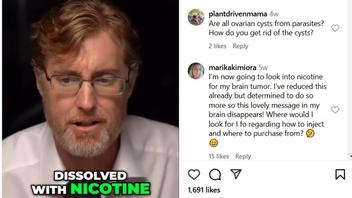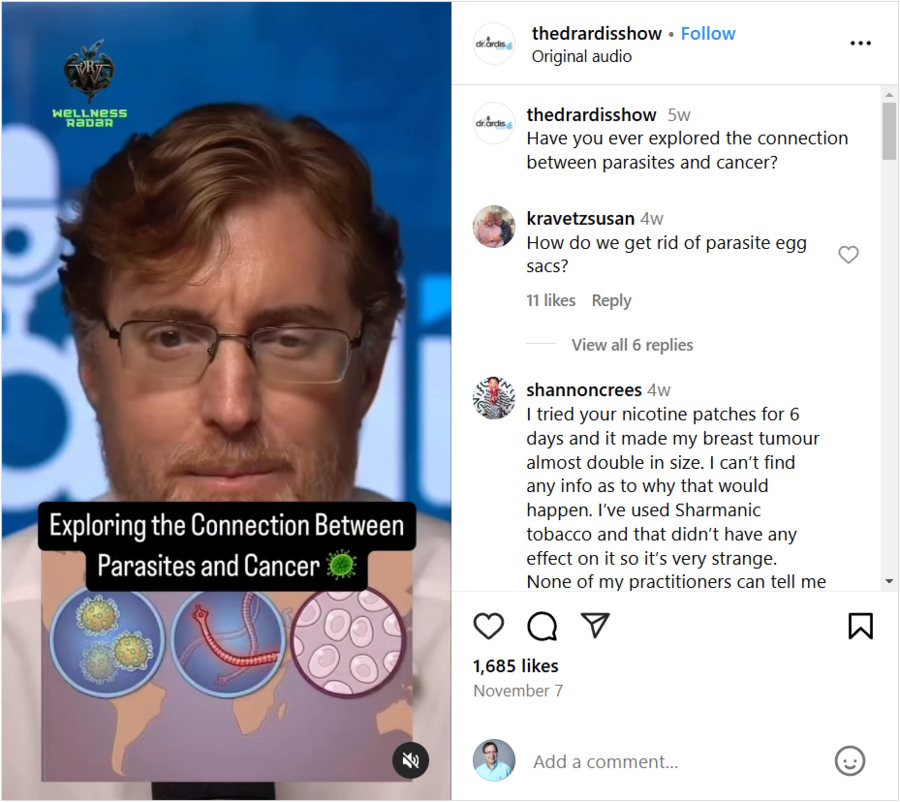
Does nicotine eliminate brain tumors? No, that's not true: A brain cancer expert from the University of Nebraska Medical Center said nicotine doesn't help and may actually reduce a person's chances of recovering from brain tumors or cancer. Nicotine is harmful, addictive and can raise the risk of certain cancers.
The claim appeared in a post and video (archived here) published on Instagram by Bryan Ardis, a podcaster, conspiracy theorist, dietary supplement entrepreneur and retired chiropractor, on November 7, 2024, under the on-screen title "Exploring the Connection Between Parasites and Cancer." The post's caption said:
Have you ever explored the connection between parasites and cancer?
This is what the post looked like at the time of writing:
(Source: X screenshot taken on Wed Dec 11 17:33:52 2024 UTC)
Near the end of the 83-second video, Ardis said:
[C]ancers are dissolved with nicotine. In fact, Brain tumors can be dissolved in less than three days with nicotine.
Also in the video, Ardis claimed:
[P]arasites are the number one cause of cancer in America.
Neither the post nor the video provided any proof to support its assertion that nicotine gets rid of brain tumors.
Expert
Dr. Nicole Shonka, a neuro-oncologist at Nebraska Medicine, told Lead Stories in a December 12, 2024, email that nicotine does nothing to eliminate or dissolve brain tumors. She said:
Glioblastoma, the most common form of primary brain cancer in adults, spreads more aggressively when exposed to nicotine, and is more resistant to therapies. Those who continue to smoke after diagnosis have poorer outcomes.
Regarding secondary brain cancer (ie cancers metastatic to the brain), there are studies showing that nicotine increases the likelihood of lung cancer cells traveling to the brain.
More on nicotine's negative impact on cancer is available here, here and here. (archived here, here and here).
Asked about Ardis' claim that parasites are the leading cause of cancer in the United States, Shonka responded, "Not at all," adding:
People are more likely to get cancer with age, and a majority are caused by environmental and behavioral risk factors. Common examples include obesity, smoking, alcohol, tobacco, and sunlight. There are some viruses that cause cancer as well, such as HPV, HIV, HBV and HCV.
The National Cancer Institute's page (archived here) on "Risk Factors for Cancer" goes into more detail.
Google search
Lead Stories could find nothing to support this claim. Any treatment that could dissolve cancerous tumors in days would be big news and would be widely reported.
A Google News search (archived here) using the phrase "nicotine dissolves tumors" yielded more than 20 results but none of them supported the claim's authenticity.
A separate Google News search (archived here) for "nicotine cancer treatment" found many stories, but none that support the chemical as a way to treat cancer.
Centers for Disease Control and Prevention
The Centers for Disease Control and Prevention (CDC) echoed Shonka. telling Lead Stories in a December 12, 2024, email that "CDC is not aware of any scientific evidence that supports this claim." Regarding the assertion by Ardis that parasites are the No. 1 cause of cancer in America, the CDC said:
The leading preventable causes of cancer are tobacco use, obesity, and alcohol.
More information is available here (archived here).
Another harmful effect of nicotine is its addictive properties, which are similar to alcohol or drug addiction and can cause physical and psychological dependence. A CDC video (archived here) includes more complete details. It's embedded below:
Also, the "Cancer Treatments" page (archived here) on the CDC website makes no mention of nicotine. Under the "Common types of cancer treatment" section, it says:
Cancer treatment may include:
- Surgery: An operation in which doctors cut out the cancer.
- Chemotherapy: Use of special medicines to shrink or kill the cancer. The drugs can be pills you take or medicines given in your veins, or sometimes both.
- Radiation therapy: Using high-energy rays (similar to x-rays) to kill the cancer.
- Hormonal therapy: Blocks cancer cells from getting the hormones they need to grow.
- Immunotherapy: Works with your body's immune system to help it fight cancer cells or to control side effects from other cancer treatments.
- Stem cell transplant (bone marrow transplant): Replacing bone marrow cells lost due to very high doses of chemotherapy or radiation therapy. Most commonly used to treat blood cancers and cancers that start in the lymph nodes.
Read more
Additional Lead Stories fact checks of claims involving Bryan Ardis can be found here.
Other Lead Stories fact checks of health claims can be found here.
















